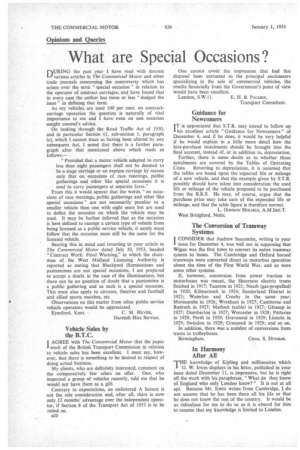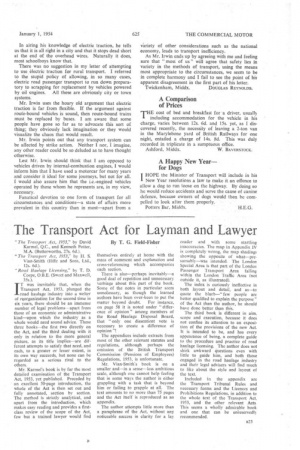Opinions and Queries
Page 54

Page 57

If you've noticed an error in this article please click here to report it so we can fix it.
What are Special Occasions?
DURING the past year 1 have read with interest various articles in The Commercial Motor and other trade journals concerning the controversy which has arisen over the term "-special occasion" in relation to the operator of contract carriages, and have found that in every case the author has more or less "dodged the issue" in defining that term.
As my vehicles are used 100 per cent. on contractcarriage operation the question is naturally of vital importance to me and I have even on one occasion sought counsel's advice.
On looking through the Road Traffic Act of 1930, and in particular Section 61, sub-section 1, paragraph (c), which I cannot trace as having been altered by any subsequent Act, I noted that there is a further paragraph after that mentioned above which reads as follows:— " Provided that a motor vehicle adapted to carry less than eight passengers shall not be deemed to be a stage carriage or an express carriage by reason only that on occasions of race meetings, public gatherings and other like special occasions it is used to carry passengers at separate fares."
From this it would appear that the words "on occasions of race meetings, public gatherings and other like special occasions" are not necessarily peculiar to a smaller vehicle than one with eight seats but are used to define the occasion on which the vehicle may be used. It may be further inferred that as the Occasion is here defined to exempt a certain type of vehicle from being licensed as a public service vehicle, it surely must follow that the occasion must still be the same for the licensed vehicle.
Bearing this in mind and reverting to your article in The Commercial Motor dated July 10, 1953, headed "Contract Work: Final Warning," in which the chairman of the West Midland Licensing Authority is reported as stating that Blackpool illuminations and pantomimes are not special occasions, I am prepared to accept a doubt in the case of the illuminations, but there can be no question of doubt that a pantomime is a public gathering and as such is a special occasion. This must also apply to circuses, theatres and football and allied sports matches, etc.
Observations on this matter from other public service vehicle operators would be appreciated.
Eynsford, Kent. C. M. HEVE.R, Darenth Hire Service. •
Vehicle Sales by the B.T.C.
I AGREE with The Commercial Motor that the paper 1 work of the British Transport Commission in relation to vehicle sales has been excellent. I must say, howL ever, that there is something to be desired in respect of doing actual business.
My clients, who are definitely interested, comment on the comparatively few oilers on offer. One, who inspected a group of vehicles recently, told me that he would not have them as a gift.
Contrary to expectations, an unfettered A licence is not the sole consideration and, after all, there is now only 12 months' advantage over the independent operator, if Section8 of the Transport Act of 1953 is to be relied on.
B20 One cannot avoid the impression that had this disposal been entrusted to the principal auctioneers specializing in the sale of commercial vehicles, the results financially from the Government's paint of view would have been excellent.
London, S.W.11. E. H. B. PALMER, Transport Consultant.
Guidance for Newcomers
IT is appreciated that S.T.R. may intend to follow up I his excellent article "Guidance for Newcomers" of December 4, and if he does, it would be very helpful if he would explain in .a little more detail how the hire-purchase instalinents should be brought into the final account, instead of, or in addition to, depreciation.
Further, there is some doubt as to whether those instalments are covered by the Tables of Operating Costs. Reverting to depreciation, it is assumed that the tables are based upon the expected life or mileage of a new vehicle, and that the example given by S.T.R. possibly should have taken into consideration the used life or mileage of the vehicle proposed to be purchased from the B.R.S. He may, of course, argue that the purchase price may take care of the expended life or mileage, and that the table figure is therefore correct. L. DoNsoN HoLmEs, A.M.Inst.T. West Bridgford, Notts.
The Conversion of Tramway Systems
I CONSIDER that Andrew Seacombe, writing in your 1 issue for December 4, was well out in supposing that Wigan was the first town to convert its entire tramway system to buses. The Cambridge and Oxford horsed tramways were converted direct to motorbus operation about the time of the First World War, and so were some other systems.
If, however, conversion from power traction to motorbuses was meant, the Sheerness electric trains finished in 1917; Taunton in 1921; Neath (gas-propelled) in 1920; Kilmarnock in 1924; Sunderland District in 1925; Waterloo and Crosby in the same year; Morecambe in 1926; Wrexham in 1927; Camborne and Redruth in 1927; Matlock (cable) in 1927; Glossop in 1927; Dumbarton in 1927; Worcester in 1928; Potteries in 1928; Perth in 1929; Gravesend in 1929; Lincoln in 1929; Swindon in 1929; Greenock in 1929; and so on.
In addition, there was a number of conversions from trams to trolleybuses.
Birmingham. CHAS. S. DUNBAR.
In Harmony • After All
THE knowledge of Kipling and millionaires which G. W. Irwin displays in his letter, published in your issue dated December 11, is impressive, but he is right off the mark with his paraphrase, "What do they know of England who only London know?" It is not at all apt. Because Mr. Irwin writes from Cambridge, I do not assume that he has been there all his life or that he does not know the rest of the country. It would be as ridiculous for me to do so as it is absurd for him to assume that my knowledge is limited to London. In airing his knowledge of electric traction, he tells us that it is all right in a city and that it stops dead short at the end of the overhead wires. Naturally it does, most schoolboys know that.
There was no suggestion in my letter of attempting to use• electric traction for rural transport. I referred to the stupid policy of allowing, in so many cases, electric road passenger transport to run down preparatory to scrapping for replacement by vehicles powered by oil engines. All these are obviously city or town systems.
Mr. Irwin uses the hoary old argument that electric traction is far, from flexible. If the argument against route-bound vehicles is sound, thin route-bound trains must be replaced by buses. I am aware that some people have gone so far as to advocate this sort of thing; they obviously lack imagination or they would visualize the chaos that would result.
Mr. Irwin points out that any transport system can be affected by strike action. Neither I nor, I imagine, any other reader could be so deluded as to have thought otherwise.
Lest Mr. Irwin should think that I am opposed to vehicles driven by internal-combustion engines, I would inform him that I have used a motorcar for many years and consider it ideal for some journeys, but not for all. I would also assure him that the i.c.-engined vehicles operated by those whom he represents are, in my view, necessary.
Fanatical devotion to one form of transport for all circumstances and conditions—a state of affairs more prevalent in this country than in most—apart from a variety of other considerations such as the national economy, leads to transport inefficiency.
As Mr. Irwin ends up by agreeing with me and feeling sure that " most of us" will agree that safety lies in variety in the methods of transport, using the means most appropriate to the circumstances, we seem to be in complete harmony and I fail to see the point of his apparent disagreement in the first part of his letter.
Twickenham, Middx. DOUGLAS REYNOLDS.
A Comparison of Prices
THE cost of bed and breakfast for 'a driver, usually including accommodation for the vehicle in his charge, varies between 12s. 6d. and 15s. yet, as I discovered recently, •the necessity of leaving a 2-ton van in the Maryle bone yard of British Railways for one night, entailed a charge of 14s. 8d. This was duly recorded in triplicate in a sumptuous office.
Ashford, M iddx. W. BAVERSTOCK.
A Happy New Year— for Dogs
I HOPE the Minister of Transport will include in his
New Year resolutions a law to make it an offence to allow a dog to run loose on the highway. By doing so he would reduce accidents and serve the cause of canine defence, because owners of dogs would then be corn. pelted to took after them properly.
Potters Bar, Middx. H.E.G.




























































































